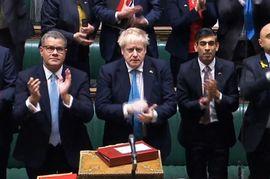The Chancellor can afford to put next month's national insurance hike on hold for 12 months, a former Treasury official said yesterday.
Sir Charlie Bean, who left the Office for Budget Responsibility at the end of last year, said the 1.25 percentage point rise is 'political' and that there would be 'no problem' postponing it for a year.
The increase, which will leave the average worker paying an extra £255 in taxes from April, comes amid a string of price surges including a jump in the energy price cap, taking average bills to £3,000 this year.
The Prime Minister and Chancellor insist the £12billion a year it will raise is needed to provide long- term funding for the NHS and social care.
But Sir Charlie - who was also previously deputy governor at the Bank of England - told the BBC ahead of the Spring Statement: "There is no problem in the UK borrowing several billion pounds for one extra year.
"What you can't run is sustained large deficits, but the pace at which you close a deficit is basically a political judgement."
The Treasury said: "We recognise the pressures people are facing with the cost of living and are providing support worth around £20billion this financial year and next to help."
Video LoadingVideo UnavailableClick to playTap to playThe video will auto-play soon8CancelPlay nowEmployees, employers and the self-employed will all pay 1.25p more per pound in National Insurance (NI) from April 2022 if the hike goes ahead.
The National Insurance tax increase will come into force in April and eventually be rebranded as a Health and Social Care Levy from 2023.
Under it, the average worker will pay an extra £255 a year in taxes. An employee on a £20,000 a year salary will pay an extra £89.
Higher earners on £50,000 per year would pay an extra £464.
Working adults, including those over the state pension age, will have to pay the 1.25% levy.

However, people earning under £9,880 a year, or £823 a month, don't have to pay National Insurance and won't have to contribute.
National Insurance was introduced in 1911 to provide a fund for workers who had lost their job or who needed medical treatment. It is now used to pay for the NHS, benefits and the state pension.
The money goes into a "ring-fenced" fund - which means that it has to be used for these purposes - but the government can borrow from the National Insurance fund to pay for other projects.
Is the tax rise justified? Let us know in the comment below
From April, the extra 1.25% will appear on payslips as a higher National Insurance tax, but in April 2023, NI will return to its current rate, and the extra tax will be collected as a new Health and Social Care tax.
The money, according to the government, will then go on social care only.
The rates of dividend tax will also increase by 1.25% to help fund the package.
Under it, someone on £30,000 will see their National Insurance contributions go up by £214 a year - to £2,665.
A worker on £50,000 will shell out an extra £464 a year - to £5,315.
And someone earning £100,000 will pay an extra £1,089 a year - taking their total contribution to £6,967.
Boris Johnson insisted that “those who earn more pay more”, with the highest earning 14% of people paying around half the revenues.
Think tank the Resolution Foundation says a typical 25-year-old today will pay an extra £12,600 over their working lives from the increase in employee National Insurance alone, compared to nothing for a pensioner relying on pension income.
How much more tax will I pay under the National Insurance rise?
Read More
Read More
